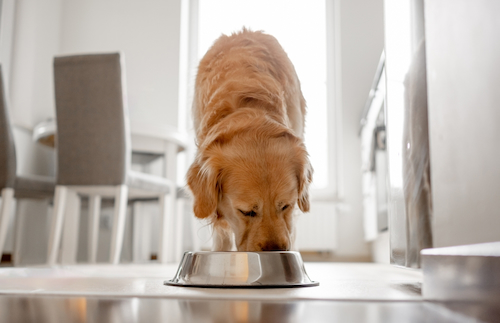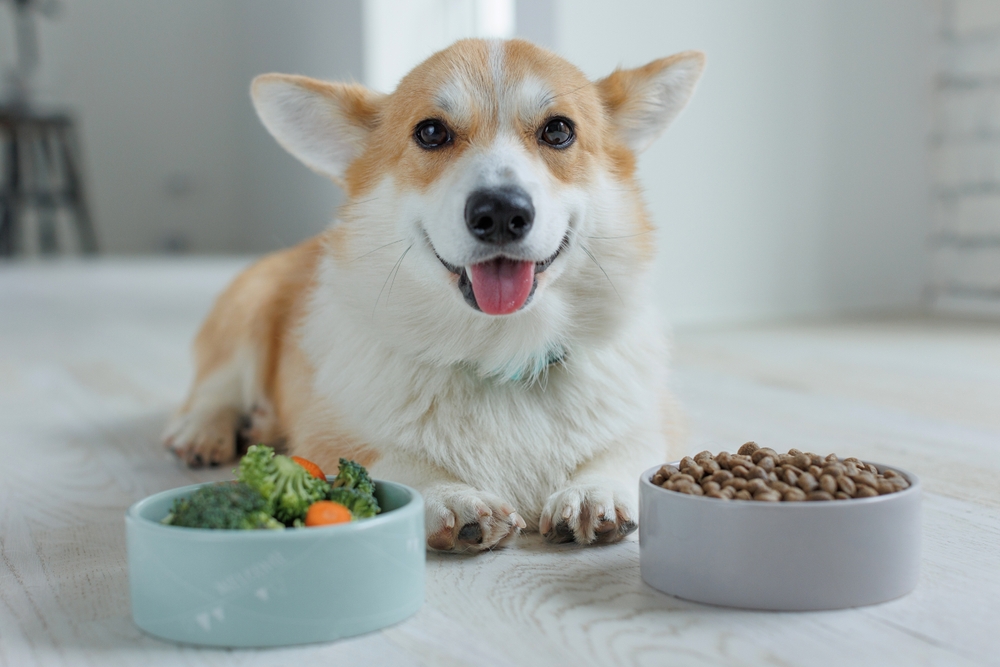Small Breed Dog Food: What To Look For and Why It Matters

If you’ve got a small dog, then you know that they often come with lots of big-dog energy and attitude. Yet, no matter how big your small dog thinks they are, it’s important to feed them food that fits their smaller stature. That’s why it’s important to consider a small breed dog food that’s specifically designed to meet the unique nutritional and health needs of small and mini dogs.
Small breed dogs have a naturally smaller jaw size, which means they may benefit from diets including smaller-sized kibble, like Hill’s Science Diet Small Paws Dry Dog Food, which is scaled down to fit smaller mouths.

Also, because small dogs typically live longer than larger dogs, smaller breeds need food that’s densely packed with healthy ingredients, vitamins, and nutrients, so they can get the maximum nutritional benefit from every bite.
That’s a pretty tall order! To help you choose the best food for your small breed dog, here’s everything you need to know about small dog and their nutritional needs.
What’s So Different About Small Breed Dogs?
First, it’s important to understand what defines a small breed dog. Dogs under 30 pounds are typically considered a small breed, says Lindsay Butzer, DVM, small animal general medicine veterinarian at the Clint Moore Animal Hospital in Boca Raton, Fla.
Although toy and miniature dogs fall under the umbrella of small breed, they have their own classifications. Miniatures usually clock in at less than 20 pounds while toy breeds weigh under 15 pounds.
Of course, several factors differentiate small breed dogs from large ones, but longevity is perhaps the most well-known. Depending on the breed, smaller dogs tend to live between 12 and 14 years while larger breeds typically live anywhere from eight to 11 years, Butzer says.
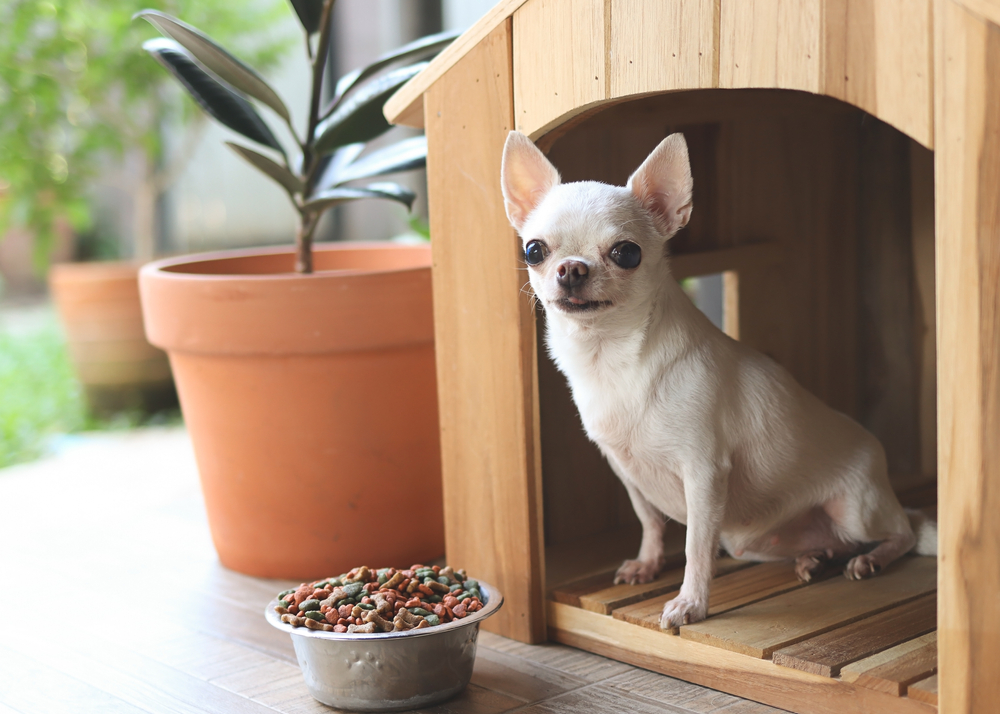
Because many smaller breeds weren’t historically bred for their athleticism, small breed dogs tend to have lower exercise requirements than larger breeds, although this varies by breed, says Jo Myers, DVM, veterinary consultant for Vetster in Salida, Colo.
For instance, Jack Russell terriers are incredibly high-energy small breed dogs, while Pekingnese, who were bred to be lap dogs, typically have lower energy and require less exercise to be well-adjusted and happy.
Smaller breed dogs may also be more prone to certain health conditions, most notably, dental disease and tooth loss, which tend to occur in small breed dogs between 8-10 years old. Other health concerns prevalent in small breed dogs include heart disease and gastrointestinal issues.
Fortunately, there are small breed dog foods that target such health issues. You can feed your pup a sensitive dog food specially formulated for small breed dogs, such as Hill’s Science Diet Sensitive Stomach & Skin Small Breed Adult Dry Dog Food. Feeding small breed dogs a lower sodium diet could even help prevent progressive heart issues, Butzer says.
Nutrition for Small Breed Dogs
When it comes to commercial dog food, there are no nutritional requirements specific to small breed dogs. “They can thrive on any type of dog food labeled as ‘nutritionally complete’ according to standards set by the Association of American Feed Control Officials (AAFCO),” Myers says.
However, small breed dogs have different calorie requirements than larger breeds. Small dogs require fewer total calories per day than their larger canine counterparts, yet more calories per pound of their body weight. For instance, while larger dogs need about 10 to 20 calories per pound, smaller dogs need about 40 calories per pound.
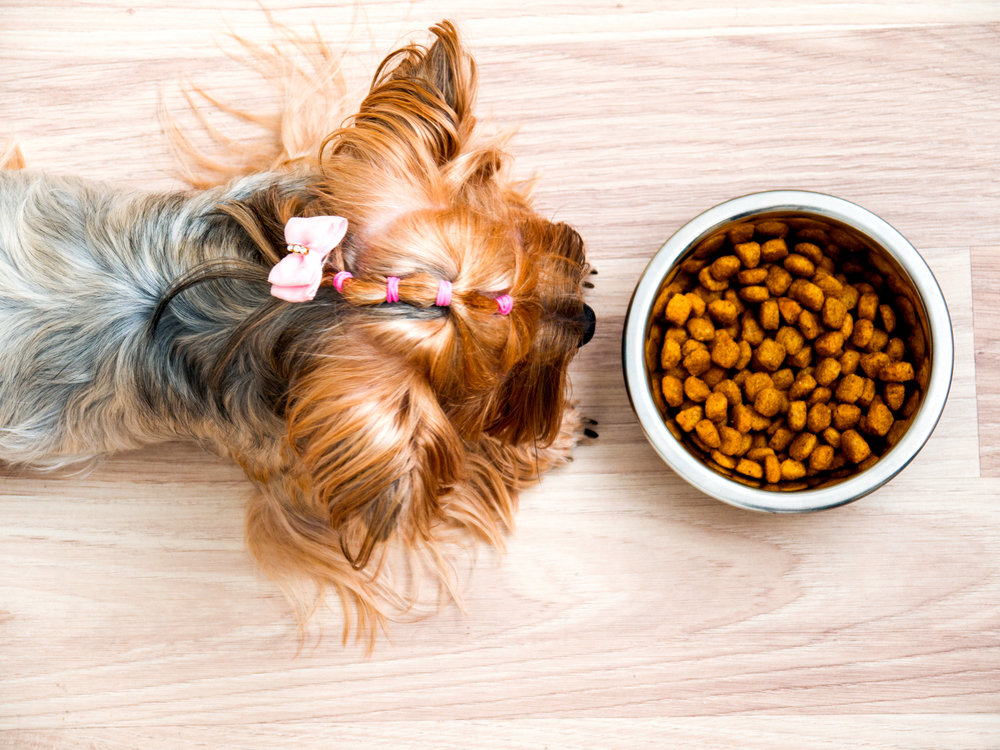
“Smaller dogs tend to burn more energy per unit of body weight compared to larger dogs,” Butzer says. Plus, their body temperature typically runs a bit higher, which can contribute to a faster metabolic rate. As a result, foods formulated for smaller dogs are usually more calorie-dense and may contain a larger percentage of proteins and fats to ensure small dogs get the nourishment they need.
Calorie requirements and feeding recommendations change according to your small breed dog’s age and stage of life, too. Small breed puppies may need four to five meals a day to keep their blood sugar up, Butzer says.
Until they turn one, you should serve your small breed dog at least three meals a day, ideally using a formula designed specifically for small breed puppies, like Hill’s Science Diet Small Breed Puppy Dry Dog Food. By the time they turn two, you can probably move to two healthy meals a day.
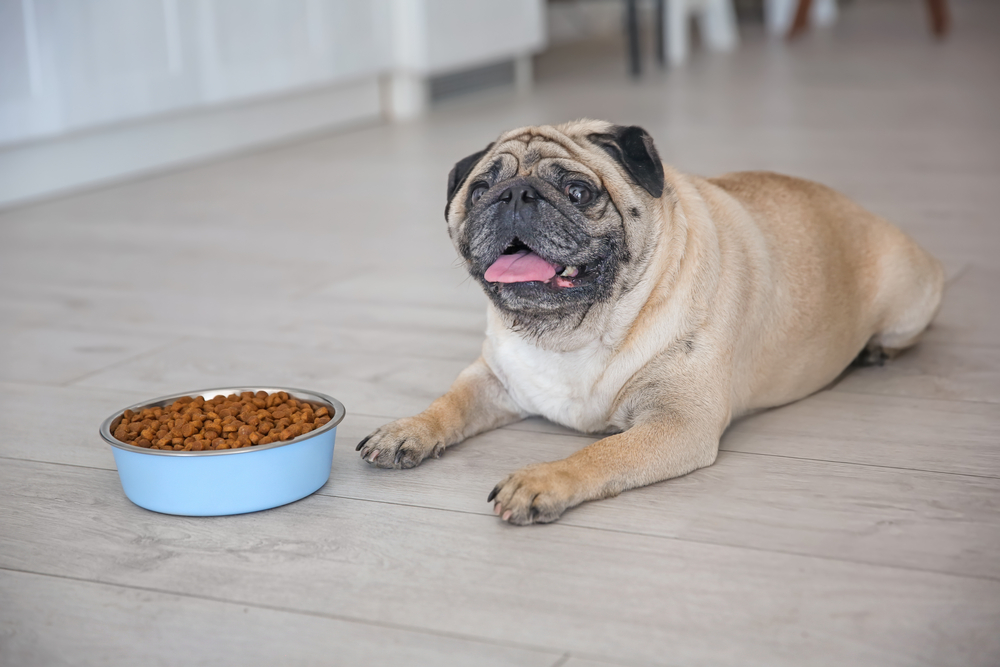
Another health challenge small breed dogs face is that even a few pounds of extra weight can have a greater impact on their smaller frames than it would for larger breeds. Dog obesity can lead to health complications like arthritis, diabetes, respiratory problems, and reduced life expectancy.
That’s why it’s so important not to overfeed small breed dogs. Be sure to check portion sizes on labels and factor in your dog’s size, weight, and activity level, Myers says. You can also ask your veterinarian to recommend a healthy weight dog food appropriate for small breed dogs, such as Hill’s Science Diet Perfect Weight Small Breed Adult Dry Dog Food or Hill’s Science Diet Light Small Breed Adult Dry Dog Food.
Small Breed Dog Food: What to Consider
With so many small breed dog foods on the market, choosing the right one can be overwhelming. Consider these expert tips when you’re weighing small or mini breed dog food options for your pint-sized pup.
Read the label carefully. Of course, no matter what size your dog is, always make sure the food is labeled as “nutritionally complete” according to standards set by AAFCO, Myers says. While most commercial dog foods have this, certain high-end, exotic, or boutique foods don’t. Also, avoid those that list preservatives like butylated hydroxyanisole (BHA) and butylated hydroxytoluene (BHT) in the ingredients. “Both have been linked to cancer in dogs,” Butzer says.
Consider cost and reputation. Food for small breed dogs doesn’t necessarily come with a smaller price tag. (Though wouldn’t that be nice?) So, shop according to your budget, but remember that you get what you pay for. If you’re going to spend a bit more on small breed dog food, look for options that are formulated by veterinary nutritionists and recommended by veterinarians.
And be sure to consider the brand’s reputation, as well as reviews from pet parents. A quality small dog food brand may cost more, but should have “rigorous testing and quality control to protect pets from food contamination, and alert pet owners if they do have any recalls,” Butzer says.
Picky pup? Try a mix of wet and dry food. The most important thing about the food you choose for your dog is that they actually eat it! However, if your dog is on a wet-food-only diet, you may want to consider the benefits of dry food to ensure your pup isn’t missing out.
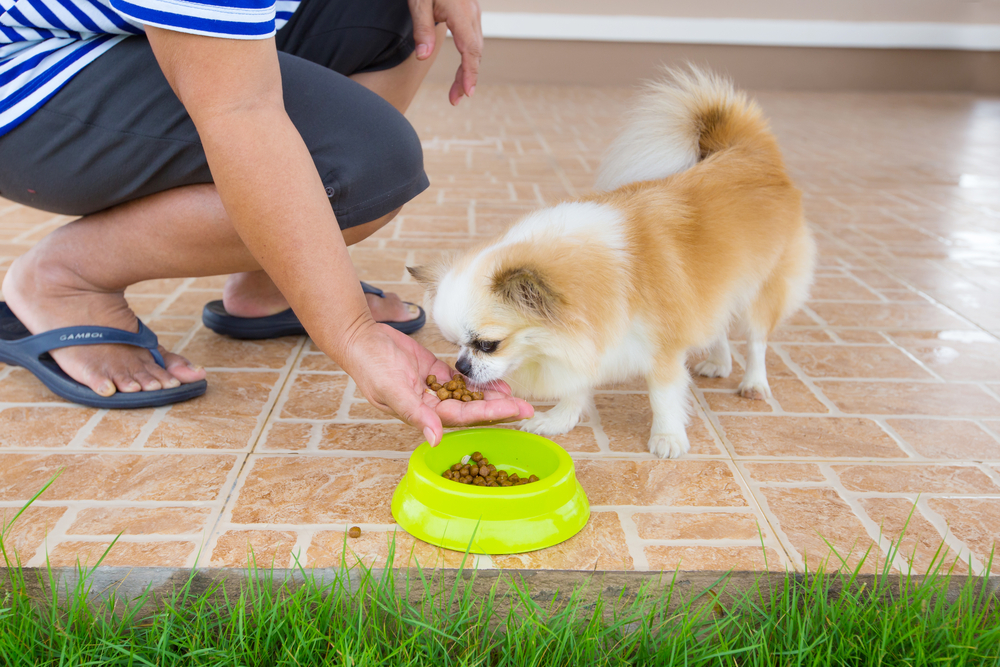
“Dry dog food is great for small breeds because it’s good for their teeth, digestion, and prevention of diarrhea,” Butzer says. If your small breed dog is picky and won’t eat unless there’s wet food in the bowl, try mixing their wet food with a bit of small breed kibble, such as Hill’s Science Diet Adult Small Paws Dry Dog Food.
The wet/dry combo may also be a good compromise for small breed dogs with dental disease. “The wet food is soft and easier for them to eat and chew if they have painful teeth, and the dry food does help fight tartar,” Butzer says.
Choose the right recipe for your senior dog. Since small breed dogs tend to live longer, they may benefit from dog food designed for the specific needs of small dogs in their golden years. According to Butzer, small dogs can live as long as 12 to 18 years.
And while not every small dog needs to eat a diet formulated for small dog seniors, it’s worth considering once your dog gets to be around 8 years old. That’s when you may see some age-related health declines, though “it all depends on their lifestyle and activity,” Butzer says.
Hill’s Science Diet Dog Food offers specialized formulas for both senior and advanced senior dogs. Hill’s Science Diet Senior Vitality Small Breed Adult Senior 7+ Dry Dog Food contains a proprietary blend of ingredients that improve dogs’ ability to get up and go, while supporting brain health, energy, and vitality. Hill’s Science Diet Small Breed Adult Senior 11+ Dry Dog Food features fish oils for joint and mobility support, plus balanced minerals for heart, kidney, and bladder health.
Small Breed Dog Food FAQs
Does my dog need small breed dog food?
If you have a smaller dog, small breed dog food may be the best option, especially because the size of kibble in small breed dog foods is easier for tiny pups to chew and digest, Butzer says. To figure out if your dog’s kibble is too big, observe how many pieces they eat in one bite. “If they’re only fitting one piece in at a time, you should consider a smaller kibble,” she adds.
What are the benefits of small breed dog food?
Small breed dog food has numerous benefits for smaller dogs. For starters, small breed dog kibble is typically one-half to one-third the size of standard kibble, which makes it easier for small dogs to consume and reduces the risk of choking, Butzer says.
Plus, those smaller kibble pieces also aid in fighting dental disease, which is prevalent in small breed dogs. According to Butzer, “The spaces between their teeth are smaller, and larger kibble pieces may not crunch into pieces small enough to clean those spaces.”
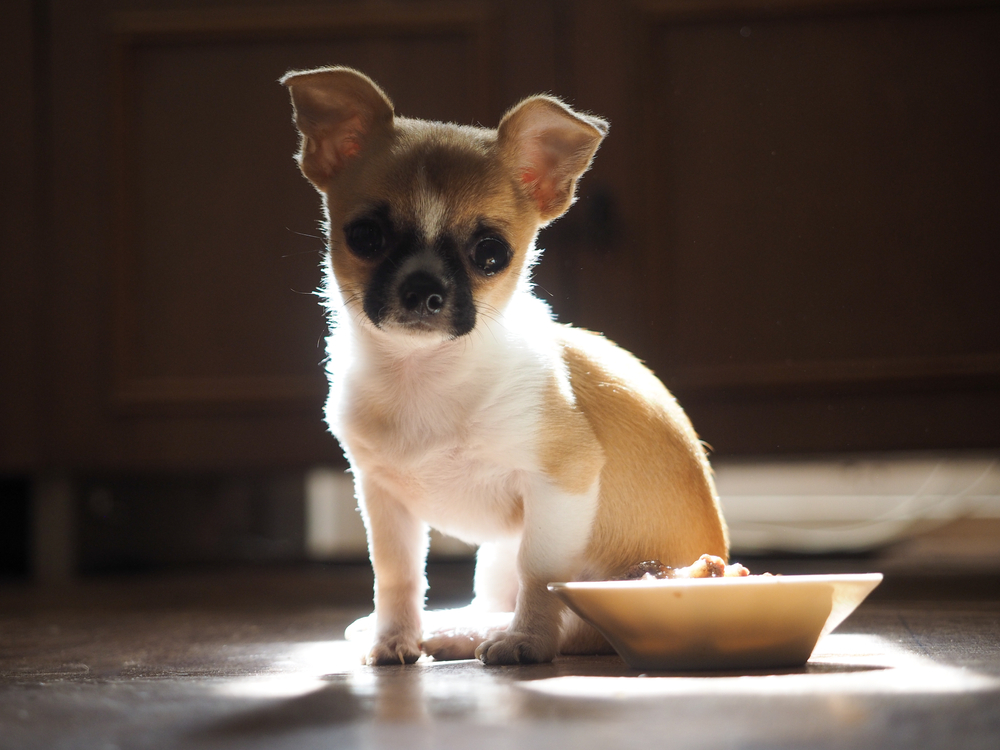
If you have a small breed puppy, do you have to feed small breed puppy food?
Not necessarily. A small breed puppy can eat any type of nutritionally complete puppy food, as long as they enjoy it and are growing at a healthy rate. That’s different from large breed puppies, who are predisposed to certain health conditions associated with rapidly growing skeletons, and so require food formulated to address this.
However, not all puppy food is created equal. If you have a small breed, toy, or mini pup, it may be worth trying out a recipe formulated specifically for small pups, like Hill’s Science Diet Small Breed Puppy Dry Dog Food, to see if they prefer to nibble on smaller-sized kibble.
Is it bad to feed your adult small breed dog food designed for large dogs?
As long as the food is nutritionally complete and balanced, it’s safe. But it may not be ideal, according to Butzer. Large breed dog food tends to be less energy dense than food for smaller dogs. That means your small breed dog may be missing out on valuable nutrients while eating unnecessary calories.

